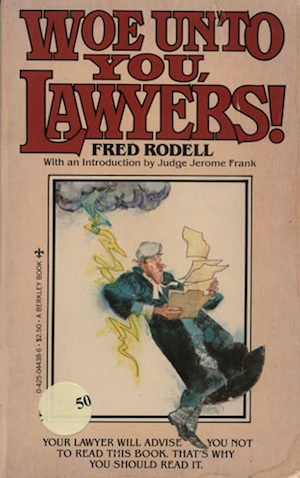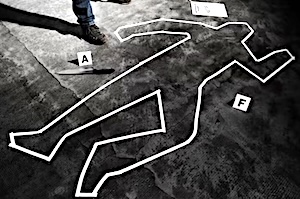High class racketeering
 Tulkinghorn •
Tulkinghorn •  Monday, May 20, 2013
Monday, May 20, 2013 The personal injury racket ... The no win, no fee racket ... The after-the-event insurance racket ... The unauthorised practice of law racket ... Tulkinghorn examines the meaty bone and its associated lawyer rackets
According to US law professor emeritus Ken Vinson:
"Fred Rodell was an iconoclastic law professor whose voluminous writings legal academics have done their best to suppress and omit reference to."
(See: Fred Rodell's Case against the Law)
Vinson says that Rodell, "became maybe the nation's best-known law professor".
It seems that Rodell had an IQ of around 180. When he "proved" what lawyering was really about, legal academics responded in much the same way as Ned Flanders did when Homer "proved" the non-existence of God.
As Vinson put it:
"Legal academics retaliated by pretending that Woe's creator didn't exist ..."
 Amongst Rodell's writings is a book "Woe Unto You, lawyers!" (available for free here) in which he said:
Amongst Rodell's writings is a book "Woe Unto You, lawyers!" (available for free here) in which he said:
"The legal trade ... is nothing but a high-class racket."
The "high-class racket" is comprised of many rackets of varying sizes.
The no win no fee personal injury (PI) racket, supported by the Conditional Fee Agreement (CFA) is one of the bigger ones.
It exists throughout the common law world, but with countless permutations from country to country, state to state, and province to province.
In each jurisdiction "reforms" are made, sometimes even reforming things back to what they were before the last lot of "reform". For example, in the UK, "after the event" (ATE) insurance was legalised in 1995.
Under this, the plaintiff could take out insurance against losing, and then in the event of a "win" (and who defines a "win" is, by the way, always a good question) the plaintiff could claim the ATE premium from the defendant.
That rort has been reformed out of the law in the UK as from April 1 this year. The combination of CFA and ATE had meant a plaintiff could not lose, which is why Lord Justice Jackson in his Review of Litigation Costs Preliminary Report Volume Two had described it as a "magic bullet" (at page 479).
The latest fee situation in the UK is largely explained here.
The many variants of the PI racket do however have one thing in common. A person called Ned Beaumont has written a book called Everything's a Racket.
According to a review of the book ...
"Mr Beaumont defines the essence of racketeering as a means by which the lazy and incompetent seek to gain something for nothing."
That is also the essence of the personal injury racket.
US law professor Lester Brickman opens his 2011 book Lawyer Barons with the story of Mary Corcoran, who was offered US$1.4 million before she had hired a lawyer on a 25 percent fee deal.
The law firm concerned did lots of lawyering before concluding that she should accept the US$1.4 million. The lawyers took 25 percent ($350,000) of it.
This high class racketeering was upheld by an Illinois trial court and an appeals court.
Allstate Insurance is a big US insurer which commenced making offers to claimants directly, telling then to consult lawyers by all means, but to agree to pay legal fees only on whatever excess over the offer the lawyer achieved.
In other words, to pay only for added value and only for a proportion of that.
Brickman (in Lawyer Barons) says that at least 56 lawsuits were filed against Allstate in 22 states, contending that this procedure by the insurance company was "fraudulent, deceptive, illegal, and the unauthorised practice of law" (UPL).
You can see Brickman being interviewed about his book where he discusses the Allstate saga at around 24 minutes in.
Various US courts held that Allstate, by advising people to insist on a value added fee deal, was engaged in UPL and was therefore acting illegally.
It is an open question whether Australian UPL restrictions could be made to work the same way.
If our Legal Services Commissioners and the like wanted to do something really useful for consumers, then instead of putting preserve the status quo contingency fee consumer advice on their websites they would put prime time advertisements on TV advising potential personal injury claimants to insist on an "Allstate proportion of value added" fee agreement.
Another way to reduce or eliminate the cut that lawyers take out of personal injury payments is by going over to no fault regimes.
This would reduce or put an end to lawyer involvement by removing the need to have arguments over "fault".
The standard (and more or less the only) lawyer argument against abolition of fault is that people will stop being as careful once they are no longer legally liable for their negligence.
That argument overlooks the far more effective deterrent effect of the criminal law. Also, Professor Paul H. Rubin and Joanna Shepherd of Emory University say tort reform leads to fewer non-motor vehicle accidental deaths.
They estimate that tort reform in the USA led to 24,000 fewer deaths for the period 1981-2000.
See: Tort Reform and Accidental Deaths
But, as Mark McCormack wrote in his book What They Didn't Teach Me at Yale Law School:
"Anyone who has ever imagined trying to take a nice meaty bone away from a pack of Dobermans will have an idea of the difficulty of getting lawyers to accede to meaningful reform."
And it is a meaty bone.
There is about $1.3 billion in personal injury legal fees up for grabs each year. Solicitors get $1 billion (2008 Australian Bureau of Statistics figures) and barristers get $300 million:
"Barristers derived the majority of their fee income from commercial law, which accounted for 27.3 percent of total fee income (or $377.7 million), followed by personal injury law which accounted for 21.7 percent (or $300.4 million) and criminal law which accounted for 11.8 percent (or $162.6 million)."
In February the NSW government proposed a new "no fault" scheme for motor accidents.
This won't eliminate the need to prove fault in all claims.
The current complexity will be added to.
To find out what is planned, see here.
Proponents of PI reform routinely promise that their proposed reforms will result in lots of lawyers being controlled like this ...

Closer examination may well reveal that the muzzle apparatus is made of beef jerky, with the rivets really being edible silver coloured dragées.
The chain probably won't be attached to anything.










Reader Comments